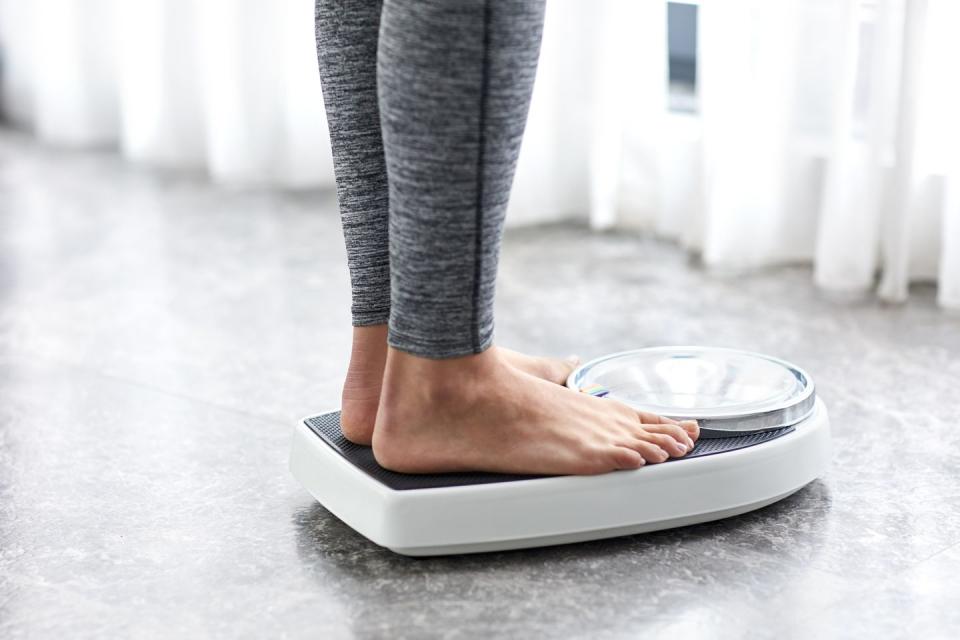6 science-backed fat burner foods and drinks

Are you considering taking a fat burner, or curious about how they work? The term can be confusing, as there are so many fat burner supplements to choose from and they can all affect the body in different ways. Many fat burners claim to boost your metabolism, help you burn more fat for fuel, or block the amount of fats your body absorbs from food.
The healthiest way to lose weight is by making conscious, sustainable lifestyle changes surrounding nutrition, exercise, and rest. However, since trimming down in this way takes time and effort, the temptation to pop a capsule or drink a shake to speed up the process can be hard to resist.
Many fat burner supplements contain natural, familiar-sounding ingredients – such as green coffee bean, raspberry ketones, or green tea extract – but that doesn't necessarily mean they're effective or safe to use. Your body is a well-oiled machine, and tweaking your physiological processes with supplements brings its own risks and side-effects.
Dr Emeka Okorocha, of fitness and lifestyle coaching app Freeletics, and clinical nutritionist Mike Wakeman, of personalised nutrition service VitMedics, answer your burning questions about fat burner supplements, from safety to side-effects and efficacy:
What are fat burners?
The term 'fat burner' describes any dietary supplement that has been 'developed with the aim of increasing or beneficially adapting fat metabolism, especially during exercise, to help promote weight loss,' says Wakeman. They usually do this, he says, by stimulating fat breakdown (known as lipolysis) or inhibiting its accumulation (known as lipogenesis). The majority of fat burner products aim to do both. Fat burners are a type of supplement.
Read the labels and you'll usually find more than one ingredient, 'each with a different mechanism of action, on the assumption that the combination will deliver additive effects,' Wakeman continues. 'For many supplements, the information supporting these claims is based on laboratory studies. More research is needed, especially well-constructed clinical trials in humans.'
How do thermo fat burners work?
Thermo fat burners are designed to boost your Resting Metabolic Rate (RMR), which refers to the number of calories you burn at rest. When your body burns calories, it generates heat – hence the term thermogenic, which means heat-producing. 'By producing heat in your body, they speed up your metabolism, aiding the metabolic process,' confirms Dr Okoracha.
Often, popular thermo fat burners contain naturally-occurring thermogenic ingredients such as caffeine, guarana or capsaicin. While many of these plant-based compounds have a proven effect on your metabolism, it's not clear whether their effects are significant enough to actually reduce body fat.

🔥 Lipolytic fat burners
Lipolytic ingredients– such as the amino acid L-carnitine – encourage your body to break down fat for fuel, rather than relying on glucose, says Dr Okoracha. They work by breaking down lipids, 'which is what fat cells are comprised of, to make the cells easier to absorb and use,' he explains. 'Although this happens naturally in the body through enzymes and water, lipolytic fat burners are designed to speed up the process.'
🔥 Fat-blockers
Fat-blocking ingredients – such as chitosan – 'interfere with the digestion of carbohydrates and fats,' says Dr Okoracha. 'While this may sound like the perfect supplement, it comes with some downsides.' These ingredients don't just block your body from soaking up fats and carbohydrates, 'they can also stop the absorption of nutrients as well,' he explains. Ironically, nutrient deficiencies can lead to unintentional weight gain.
Do fat burners really work?
There's a lack of robust scientific proof surrounding the efficacy of fat burners. While there's evidence that fat burner ingredients can boost your metabolism and help your body burn more fat, their effects are generally small, and there have not been many studies to determine whether they actually reduce body fat.
That's not to condemn all fat burner products. 'There is still a lot of research to be done into whether they're useful,' says Dr Okoracha. 'But, in my opinion when they are utilised well and safely, alongside exercise and a healthy diet, they can provide some benefit. However, the jury is still out on whether they are healthy.'
Since they're designed to supercharge a well-balanced diet and regular exercise regimen, not substitute it, it's no use chasing a fat burner with a burger and large fries. 'Healthy, sustainable fat loss will only be maintainable through regular exercise and a healthy diet,' Dr Okoracha adds. 'There is no magic pill that can completely replace or supplement that.'
Is it dangerous to take fat burners?
It's important to be aware of the potential risks and side-effects of taking fat burner supplements. Depending on the ingredients, they range in severity from symptoms such as headaches, increased heart rate and insomnia, to serious complications like inflammatory bowel disease and liver damage.
Even the minor side-effects can affect your recovery. For example, poor sleep prompts your body to hold onto fat, even if your diet remains the same. In a study by the University of Chicago, when dieters cut back on kip, the amount of weight they lost from fat dropped by 55 per cent – even though their calories stayed equal throughout the study.

Additionally, fat burner products aren't regulated as strictly as medication, nor are they tested as rigorously, so it's best to err on the side of caution – particularly if they contain high doses of stimulants, or lots of different ingredients. Always buy supplements like fat burners from a reputable retailer, and speak to your doctor before you start taking them.
'It's essential that people do their own research into the products that they are buying,' says Dr Okoracha. 'Contaminated supplements or those taken in extreme amounts can lead to high blood pressure, seizures and even death, and although these side effects may be rarer, they should not be brushed aside. Other side effects include anxiety and jitters.'
6 of the best fat burners
Believe it or not, the best fat burners can be found in your kitchen. Save your cash – and spare the health risks – with our pick of 6 science-backed fat burner foods and drinks:
1. Caffeine
Pop the kettle on and enjoy a cuppa to score a natural caffeine hit before your workout – tea and coffee typically deliver 40 to 150mg per serving, Wakeman says. Not only does caffeine rev up your internal engine by up to 11 per cent – as one study found – but it also helps your body burn more fat. Caffeine triggers the release of several neurotransmitters, including adrenaline, which 'increase energy consumption and fat oxidation, releasing fatty acids from stores in fat and muscle, thereby stimulating lipolysis,' he explains.
2. Capsaicin
Capsaicin is the compound that gives chilli peppers their spice, so it's easy to add to your diet – the spicier the pepper, the more capsaicin it's packing. This potent compound helps your body burn fat, blocks fat absorption, and reduces your appetite.
'Capsaicin has been suggested to increase fat oxidation primarily by activating receptors in nerve cells, which like caffeine, results in increased secretion of adrenaline and increased lipolysis,' says Wakeman. Other studies have shown that it inhibits lipogenesis by reducing the hunger hormone leptin, and increasing the satiety hormone adiponectin, he adds.
3. Green tea
As well as containing caffeine, green tea is extremely rich in an antioxidant called epigallocatechin gallate (EGCG), which also has thermogenic effects. The two work in synergy with one another: in an analysis of six studies, taking a combination of green tea extract and caffeine burned 16 per cent more fat than a placebo.
'Green tea extract is obtained from the leaves of Camellia sinensis, the same as black tea,' says Wakeman. 'EGCG is thought to lead to stimulation of the sympathetic nervous system and increased energy consumption.' Green tea extract is simply a power or capsule form of regular green tea, so reap the same benefits by brewing up to five cups per day.
4. Soluble fibre
Soluble fibre absorbs water as you digest it, forming a gel-like substance. Being bulky, it slows down your digestion, which helps you feel satiated. It also increases levels of hormones like GLP-1, which make you feel full while suppressing hunger hormones, like ghrelin. Soluble fibre also reduces the calories and fat you absorb from food, studies show.
You can take soluble fibre in supplement form. Glucomannan, a type of fibre that is extracted from the roots of the elephant yam – and used to make shirataki noodles – is a popular capsule. However, it's best to get fibre from whole food sources where you can. Black beans, Brussels sprouts, avocados, apricots and pears are all rich in soluble fibre.
5. Probiotics
Probiotics can reduce your body fat percentage, according to one systematic review. They appear to influence hormones and proteins related to appetite and fat storage, and lessen the number of calories you absorb from food. You don't need to take a supplement to reap the benefits: kefir, yoghurt, tempeh, kimchi, sauerkraut and miso are rich dietary sources.
Certain strains of the Lactobacillus family, particularly Lactobacillus gasseri, are especially effective for fat loss, according to early research. In a study of more than 200 people, participants who took Lactobacillus gasseri for 12 weeks saw an 8.5 per cent reduction in belly fat – and those who stopped taking the supplement gained it back within a month.
6. Protein
Protein is essential for fat-burning. It keeps you fuller for longer, and helps your body build muscle, which boosts your metabolism. In one study, participants who followed a protein-rich diet – where 25 per cent of their daily calories were made up of the muscle macro – lost 10 per cent more belly fat in the space of a year than those who ate half that amount.
The so-called 'muscle macronutrient' also curbs your appetite by increasing levels of satiety hormones like GLP-1, PYY and CCK, while reducing ghrelin levels. Start your day with a protein-rich breakfast – scrambled tofu, Greek yoghurt, or a cottage cheese omelette – and you'll eat to 135 fewer calories over the course of the day, one study found.
Last updated: 29-03-2021
You Might Also Like

 Yahoo Sport
Yahoo Sport 





































